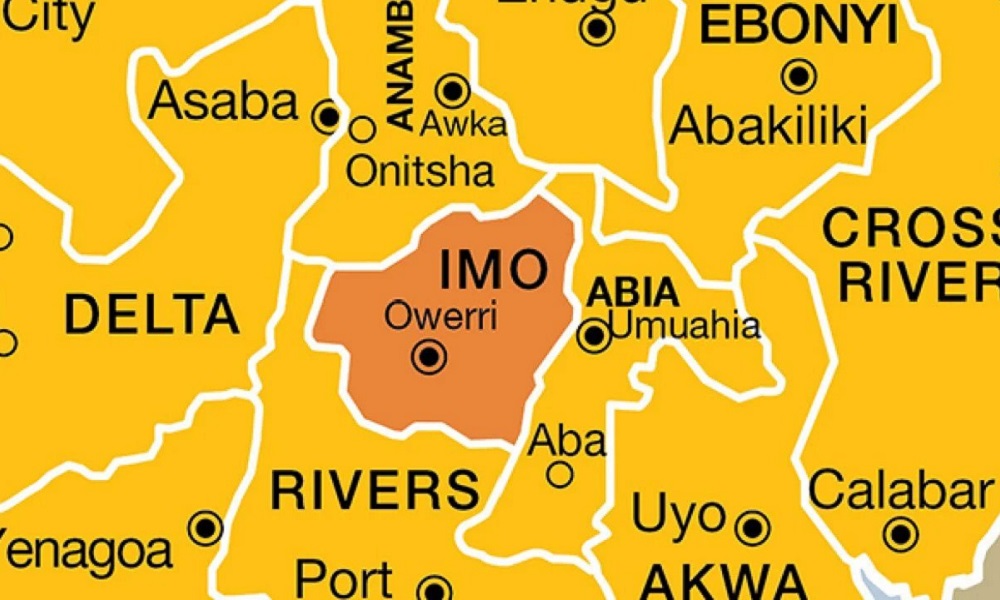News
DHQ moves to stop Lukarawa’s recruitment drive

The Defence Headquarters has said the new terrorist group, Lukarawa, has begun a recruitment process to bolster its fighting capabilities.
It, however, said the military was aware of the group’s recruitment activities and working closely with other security agencies and the state government to halt the recruitment efforts.
The DHQ had, last Thursday, confirmed the emergence of a new terrorist group known as ‘Lukarawa’ in the northern region, with operations in Sokoto and Kebbi states.
The Director of Media Operations, Maj Gen Edward Buba, said the terrorists began incursion into the northern parts of Sokoto and Kebbi states from the Niger Republic and Mali axis, particularly after the coup in the Niger Republic.
He blamed residents of the region for accommodating the terrorists and failing to report their movements to the military and other security agencies.
On Friday, the new terror group attacked Mera town in the Augie Local Government Area of Kebbi State while residents were preparing for Jumaat prayers, killing at least 15 people and carting away at least 100 cows.
Speaking in an interview with our correspondent on Tuesday, Buba said the terrorists were using sermons and welfare packages to entice the youth.
He added that the terror group was also using social media to drive its recruitment efforts.
Buba said, “The group is employing social media platforms, showcasing sermons and enticing recruits with welfare packages.
“Nevertheless, we know of these plans and are working together with other security forces and the state government to thwart the efforts of the terrorist.”
A former Director of the Department of State Services, Mike Ejiofor, argued that although the group had been in existence since 2018, the country’s intelligence agencies had been monitoring their activities.
He said the sect’s members were too few to constitute a serious threat to national security.
He said, “It must be clear that this group has been there since 2018. It’s not a new group. They have been there since 2018. They were brought in there by the community leader who wanted to help them fight. This group was formed by Nassala in Niger Republic. So when he died, the Nigerien government could not control them.
“So they were invited to assist them in Sokoto. They were there, but eventually, the Sokoto State government used their non-kinetic approach to make them leave that place through negotiation.
“Some of them remained, and they’ve been operating on a very new team. So it’s not as if it’s a new terrorist group that has just emerged.
“So they’ve been there, and the intelligence agencies have been following their activities. I can’t tell you the exact number now, but they are not men that can pose a major threat to our national security.
“But that is not to say that we will leave them. The intelligence circle is also following their activities.”
Ejiofor stated that security agencies must intensify their intelligence efforts and communities must support these agencies to help eliminate the terror group.
He said, “Yes, they might be trying to recruit some people. The intelligence services are monitoring their activities with a view to putting them in check so that they don’t take root within that area.
“There’s no cause for alarm, but you cannot at the same time underplay any security threat in the country. There’s much we can do through communal support.”
He blamed the community for not reporting the activities of the bandits.
“If they report, they’ll be in trouble. If they fail to report, they’ll be in trouble. So the best thing is to support the government.
“You know, they collect taxes from these people and make them raise funds and all these things. So they are in a precarious position.
“I think the best thing for us to do is to intensify intelligence efforts and operational efforts from the security agencies to make sure they are put in check before they spread,” he said.
A security expert, Timothy Avele, said, “From open sources we gathered the group has been in existence for the past six years.
“In fact, in some Kebbi communities, they’re collecting levies and handling judicial cases and even preventing emirs from carrying out their lawful duties.
“So it means they have been existing but have not been known to the press and general public.
“If this is confirmed to be true, it, therefore, means the security agencies, especially the DSS and police intelligence department failed in their primary responsibility of gathering and analysing strategic intelligence.”
He added that with the hardship in the country, it would be difficult to stop the group’s recruitment drive.
“However, if their sources of funds are targeted and blocked and their top leadership/sponsors (both local and foreign) eliminated, including carrying out specific cyber operations, only then it could be stopped,” he said.”
News
NSCDC, Tantita intensify joint efforts to combat oil theft in Niger Delta

The Nigeria Security and Civil Defence Corps (NSCDC) and Tantita Security Services Limited (TSSL) have intensified their joint efforts to eliminate economic sabotage in the Niger Delta, in line with the Renewed Hope Agenda set forth by President Bola Ahmed Tinubu.
As part of his inspection of NSCDC operations in the area, Commandant-General Dr. Abubakar Audi led a group of senior officers to meet with Chief Kestin Pondi, Managing Director of TSSL, and High Chief Government Ekpemupolo, commonly referred to as Tompolo, in Warri and Oporoza, Delta State.
Audi and his team also toured the operational facilities of NSCDC operatives working with Tantita in far-flung creeks of the Niger Delta and other formations to assess their activities and encourage the frontline security agents.
The Commandant-General while paying a courtesy visit to Pondi said his operational tour of the Niger Delta was to enable him get first hand information of his men on ground and strengthen the relationship between the corps and Tantita.
Audi said the NSCDC would celebrate the gallantry of his men on March 1st adding that the occasion would recognise fallen heroes of the corps and empower the families of deceased officers.
He said: “We place high premium on the welfare of our staff that is why every March 1st we recognise our personnel who died on active duty by assisting their families through payment of life insurance benefits and other empowerment schemes.”
In his remarks, the Managing Director, Tantita Security Services Ltd, Mr Kestin Pondi, heaped praises on President Ahmed Tinubu for providing the enabling environment to fight oil theft in the Niger Delta region.
He assured of closer collaboration with security forces including the NSCDC in the ongoing efforts to tackle pipeline vandalism and oil theft.
Pondi said without the collaborative efforts of the NSCDC and other security agencies, the success record would have been impossible.
He said prior to Tantita’s involvement in combating oil theft, production levels hovered around 800,000 barrels per day, adding that the increased production was because of the collaboration with NSCDC.
He said: “The success recorded in the recent past is not without the collaborative efforts of NSCDC. At the moment we have over 450 personnel in our organisation who have been providing collaborative services to our personnel.
“It is worthy of note that as at the time we came on board, the nation was producing between 600000 – 800000 barrels per day in 2022, but as at today we have gone over 2 million barrels per day and this is largely due to our collaboration with you.
A former President, Ijaw Youths Council (IYC) Worldwide, Engr. Udengs Eradiri, hailed NSCDC and Tantita for their mutual relationship saying their operational style was in line with President Tinubu’s leadership approach of community and stakeholders’ engagements.
Describing President Tinubu as a community man, Eradiri said Tinubu’s approach was centered around the people adding that in similar way Tantita and NSCDC approach instilled confidence in people to protect oil facilities within their domain.
“This is in line with President Tinubu’s leadership style. President Tinubu is a community man. His approach has always been about the people. For some of us who have known him for years ago, we are not surprised that he is doing things differently.
“Recall that when he was campaigning he came to the Gbaramatu Kingdom. President Tinubu expanded the relationship with Tantita and consolidated on what he met and that is why the trajectory has been smooth. President Tinubu is the reason Tantita is succeeding and we want to commend him for believing in Tompolo and the people,” he said.
News
Imo govt warns nightclub, lounge proprietors against selling hard drugs to customers

The Imo Government has issued a stern warning to hotel owners and nightclub operators, urging them to refrain from permitting the use of hard drugs within their establishments.
This announcement was made in a statement signed by Chief Ezechukwu Obonna, the Special Adviser to Governor Hope Uzodinma on Narcotics and Illicit Drugs Monitoring, and was shared with journalists in Owerri on Saturday.
According to Obonna, the state government has observed that hard drugs, especially cannabis, popularly called ‘loud’, are now being freely sold and consumed in public places, especially in lounges and nightclubs in the state, as if the drug is no longer prohibited by law.
He warned operators of nightclubs and lounges to immediately put an end to the consumption and sale of hard drugs, particularly in their business areas.
He said that any establishment found to be enabling or permitting the use of hard drugs would face severe consequences.
“The government is issuing this stern warning to lounge and nightclub owners across the state to note that the government will no longer tolerate the use of private businesses as havens for illicit drug use.
“We urge all lounge and nightclub owners to take responsibility for ensuring their patrons are not engaging in illicit activities.
“The Imo State Government is committed to protecting the health and well-being of its citizens, and we will not hesitate to take action against those who compromise this effort,” he said.
He added that the International Narcotics Control Board had expressed concerns about the growing trend of drug use and its impact on public health.
According to him, the Imo Government is taking proactive steps to address this issue and ensure a safer, healthier environment for all citizens.
“We appeal to all lounge and nightclub owners to cooperate with the government in this effort and to report any suspicious activities to the authorities immediately. Together, we can create a safer, more responsible tourism and entertainment industry in Imo,” he said.
News
Watch Saturday episode of Your Family Lawyer on ‘How can I get a divorce under Islamic marriage

Seasoned lawyer and progenitor of Your Family Lawyer, Chuma Chinye tackled how you can get a divorce under Islamic marriage.
Using vivid examples and solutions on how you can maintain a cool head when faced on how to get your rights under Islamic marriage.
Watch podcast below:
-

 News21 hours ago
News21 hours agoBook launch: Abacha’s daughter, Gumsu derides Babangida
-

 News21 hours ago
News21 hours agoSocial media in awe as former RCCG pastor ties nuptials with male lover
-

 News21 hours ago
News21 hours agoJustice Delayed: The Imperative for Accountability in the Wake of Ibrahim Babangida’s Autobiography
-

 News21 hours ago
News21 hours agoSAD: Finally, Police recover remains of soldier k!lled over unpaid N20m ransom
-

 News20 hours ago
News20 hours agoSee Black Market Dollar To Naira Exchange Rate Today 22nd February 2025
-

 News20 hours ago
News20 hours agoNigeria Seeks Stronger Economic Ties with China
-

 News20 hours ago
News20 hours agoGov Adeleke Votes As Osun’s LG Election Begins
-

 News20 hours ago
News20 hours agoLP Withdraws from Osun LG Election Over Security Issues







